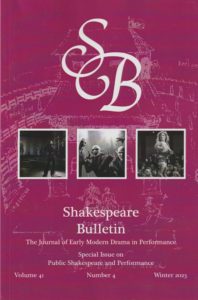When AI goes to theater with humans, it changes the dynamics of the social space. This article examines a case of audiences using an AI app on their phones to translate a sign language performance. Whom does the screen interface serve, and how do artificial intelligence tools affect theatrical publics across both the playing space and the playgoing space? Screens are a site where cultural and performative meanings are generated and negotiated.
Continue readingCategory Archives: Digital Humanities
Teaching King Lear in a Global Context

How might we engage with the “essence” of King Lear, or “Learness,” in a networked culture? Juxtaposing the clips of the division-of-the-kingdom scene from different films allows us to reexamine our perceived ethical burden to explain Lear’s problems away. The scene in Peter Brook’s 1971 film is dominated by close-ups of Lear and other characters, framing Paul Scofield’s Lear as a solemn statue. Peter Brook’s 1962 RSC production and subsequent 1971 film of King Lear engages with the theme of ecocriticism through an apocalyptic mise-en-scène.
In contrast to Laurence Olivier’s Lear in Elliott’s 1983 film, who laughs off Cordelia’s initial response, Scofield’s Lear speaks methodically and remains stern throughout the scene, which ends with him calmly banishing Cordelia. Cordelia’s aside is cut, thereby diminishing the weight of a potentially revelatory moment as well as Cordelia’s self-discovery.
Global Shakespeares
Welcome to MLA Commons. The idea that Shakespeare is a global author has taken many forms since the building of the Globe playhouse in London. Studying and teaching the diversity of the world-wide reception and production of Shakespeare’s plays can nourish the remarkable array of new forms of cultural exchange. Global Shakespeares as a research and teaching field answers the competing demands to internationalize the curriculum while maintaining traditional values.
Posted by Alexa Alice Joubin


